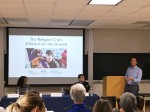This post was updated on Oct. 31 at 1:30 p.m.
A representative of a refugee aid organization projected a 15-year-old Syrian refugee’s drawing of his family’s beheading to illustrate how art helps children express trauma.
The presentation was part of a panel hosted by UCLA on Wednesday about the global refugee crisis. Representatives of three nongovernmental organizations told students and faculty how their groups provide medical care and emergency relief efforts to some 65 million refugees across the globe. The Y&S Nazarian Center for Israel Studies, Center for European and Russian Studies, Center for the Study of International Migration sponsored the panel.
The panelists focused on the refugee crisis in the Middle East, where the Syrian civil war has displaced more than 5 million refugees to date, said Margaret Traub, head of Global Initiatives at International Medical Corps and one of the panelists.
Moderator Roger Waldinger, distinguished professor of sociology at UCLA, said refugees are vulnerable to migrant entrepreneurs, who can exploit them by selling services that may or may not help them relocate. He added even if they do manage to relocate, they still face hostility from host societies.
[Related: EU ambassador addresses UCLA community regarding refugee crisis]
“These people are bakers, and architects, and teachers and moms, just like us,” Traub said. “Most people don’t leave everything they have unless they absolutely have to, and they are fleeing for an unknown future.”
The Yazidi population, an ethno-religious minority group from Kurdistan, has been targeted extensively. Yazidis endured 72 attempts of genocide in the 18th and 19th centuries alone. Because of their non-Muslim, non-Jewish and non-Christian identity, ethnic Yazidis have been persecuted throughout history, said Hadi Pir, vice president of the Yazidi advocacy group Yazda.
In recent years, the Yazidis have been targeted by the Islamic State. The Islamic State’s attack on Yazidis in 2014 left 90 percent of their population in Kurdistan displaced in just three days, according to Pir.
Pir said the Islamic State forced hostages to pray and convert to Islam and destroyed holy Yazidi sites.
Syria’s neighboring countries have already taken in many Syrian refugees. Traub said it is a huge burden to these countries – Lebanon, for example, hosts approximately 1 million refugees, although its population is only about 4 million.
“One of the keys to recovery is putting them to work,” Traub added.
This would provide them with a meaningful and productive way to live, she said.
[Related: UNA competition prompts students to create solution for refugee crisis]
IsraAID, an Israel-based disaster relief organization, provides emergency relief efforts for Syrian refugees who arrive on the shores of Lesbos, Greece, said Yotam Polizer, an IsraAID director. Volunteers look for boats close to shore, administer medical treatment to the needy and give refugees warm clothes, food and water, Polizer added.
According to a video shown at the panel, help comes to the refugees from the people they least expect. Syria and Israel have fought wars in their history, but many of IsraAID’s volunteers are Israeli or Palestinian.
IsraAID also provides psychological support to refugees. The organization held an art activity for Yazidi children, who drew scenes of their experiences in Syria. Some children drew scenes of warfare that they witnessed in the past, while others drew scenes of idyllic life in peacetime. Polizer said the organization realized art allowed children to express their trauma, so it also implemented the activity in Greece to help arriving refugees.
Traub said people remained refugees for 17 years on average and that last year the United States welcomed between 10,000 and 15,000 refugees.
“We are not taking the number we need to,” Traub said.
The panelists said they think government policies need to change to improve the situation.
“We cannot have humanitarian solutions to political problems,” Traub said.
Traub also said she thinks students have a part to play in alleviating the refugee crisis.
“As students, you can be advocating, telling friends about the refugee crisis and organizing fundraisers – it’s all about gaining knowledge and getting involved,” she said.
